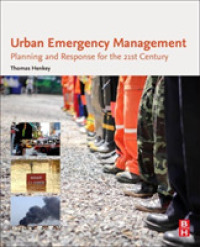- ホーム
- > 洋書
- > 英文書
- > Literary Criticism
Full Description
In "Burnt Norton," the poetic speaker enters a rose garden, a space of envisioned timeless illumination. This experience sets in motion a spiritual quest, which will confer unity upon Four Quartets. For the poet himself, it inaugurates a creative phase (mid-1930s to late-1950s) that strengthens his sense of faith and community. Eliot, increasingly interested in playwriting, completed his meditative masterpiece (Four Quartets) while undertaking his ambitious project to revive verse drama. Devotion to drama reflects Eliot's stronger social awareness, leading him to adopt popular forms: the pageant (The Rock), drawing-room comedy (The Cocktail Party, The Confidential Clerk, and The Elder Statesman), and children's literature (Old Possum's Book of Practical Cats). As a critic, he widened his scope to write about social issues (The Idea of a Christian Society, Notes Towards a Definition of Culture). These aspects of Eliot's career are influenced by concrete historical and biographical circumstances such as the impact of war and his ongoing relationship with Emily Hale, who played a decisive role as his muse, guide, and mentor in his newfound passion for the stage. Reading T. S. Eliot: The Rose Garden and After (1930s-1950s) presents original work by numerous scholars addressing these facets of Eliot's writing.
Contents
Introduction: 'Through the First Gate,' into the Rose Garden and Beyond
Dídac Llorens-Cubedo and Viorica Patea,
Part I The Poet, the Rose Garden, and the Playhouse (1930s)
Poetics of the Incarnation: T. S. Eliot's Four Quartets
Barry Spurr
Experiencing Murder in the Cathedral: How Can 'Indicative Criticism' Position Audiences to Appreciate the Play
Charles Altieri
'That moment of mystery': Eliot's Practical Cats as a Turning Point
Ester Díaz Morillo
To Speak Poetry: Eliot's Project to Revive Verse Drama
Natalia Carbajosa Palmero
'Chiefly your doing': Emily Hale and the Making of a Playwright
Sara Fitzgerald
Part II Full-Time Dramatist with a Vision (late 1930s-late 1950s)
T. S. Eliot and Classical Drama
Peter Liebregts
Eliot, Aeschylus, and Aristotle: Theme and Plot in The Family Reunion
Jewel Spears Brooker
Protean Self and Anagnorisis through Art in T. S. Eliot's The Confidential Clerk
Leonor María Martínez Serrano
'Proper Sowing' and 'right action' in Eliot's Plays and Four Quartets
Viorica Patea
After Four Quartets: T. S. Eliot's Comedies as Footnotes or Exempla
Dídac Llorens-Cubedo
Part III Critic with a Wider Scope (1940s-1960s)
To Criticize the Dramatist: Eliot on His Plays
Teresa Gibert
The Responsibility of a Christian Thinker: T. S. Eliot, World War 2, and Post War Reconstruction
Joana Rzepa
Patristic Christianity in T. S. Eliot's Philosophy of Education
John Rhett Forman
Christopher Dawson and Eliot on Culture and Politics
Benjamin Lockerd





